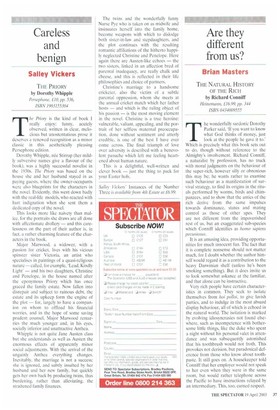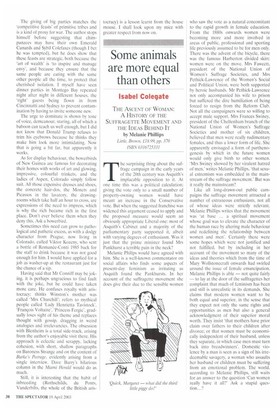Are they different from us?
Brian Masters
THE NATURAL HISTORY OF THE RICH by Richard Conniff Heinemann, 176.99, pp, 344 ISBN 0434009555 he wonderfully sardonic Dorothy Parker said, 'If you want to know what God thinks of money, just look at the people he gave it to.' Which is precisely what this book sets out to do, though without reference to the Almighty's involvement. Richard Conniff, a naturalist by profession, has no truck with moral judgments on the behaviour of the super-rich, however silly or obnoxious this may be; he wants rather to examine such behaviour as a manifestation of survival strategy, to find its origins in the rituals performed by worms, birds and chimpanzees, and to show that the antics of the rich derive from the same impulses towards dominance, status and mating control as those of other apes. They are not different from the impoverished rest of us, but an exaggerated sub-species which Conniff identifies as homo sapiens pecuttiosus.
It is an amusing idea, providing opportunities for much innocent fun. The fact that it is complete nonsense should not matter much, for I doubt whether the author himself would regard it as a contribution to the heavy Darwinian shelf (unless he's been smoking something). But it does invite us to look somewhat askance at the familiar, and that alone can be instructive.
Very rich people have certain characteristics in common. They seek to isolate themselves from hoi polloi, to give lavish parties, and to indulge in the most absurd display behaviour, all of which is echoed in the natural world. The isolation is marked by evolving idiosyncrasies not found elsewhere, such as incompetence with bothersome little things, like the duke who spent a night without his personal valet in attendance and was subsequently astonished that his toothbrush would not froth. This provokes not derision, but paradoxical deference from those who know about toothpaste. It still goes on. A housekeeper told Conniff that her employer would not speak to her even when they were in the same room. but would rather telephone across the Pacific to have instructions relayed by an intermediary. This, too, earned respect. The giving of big parties matches the 'competitive feasts' of primitive tribes and is a kind of proxy for war. The author stops himself before suggesting that chimpanzees may have their own Emerald Cunards and Sybil Colefaxes (though I bet he was tempted), but he does show that these feasts are strategic, both because the 'art of wealth' is 'to inspire and manage envy', and because they ensure that the same people are eating with the same other people all the time, to protect that cherished isolation. I myself have seen dinner parties in Montego Bay repeated night after night in different houses, the 'right' guests being flown in from Cincinnatti and Sydney to prevent contamination by having to invite someone new. The urge to dominate is shown by tone of voice, demeanour, staring, all of which a baboon can teach us well enough, but I did not know that Donald Trump refuses to trim his eyebrows because he thinks they make him look more intimidating. Now that is going a bit far, but apparently it works, As for display behaviour, the bowerbircis of New Guinea are famous for decorating their homes with works of art and glowing, impressive, colourful trinkets, and the ladies of Aspen, Colorado simply follow suit. All those expensive dresses and shoes, the concrete hair-dos, the Monets and Picassos in the lavatory, the drawingrooms which take half an hour to cross, are expressions of the need to impress, which is why the rich became rich in the first place. Don't ever believe them when they deny this. Ask a bowerbird.
Sometimes this need can grow to pathological and pathetic excess, as with a dodgy character from Prague, now living in Colorado, called Viktor Kozeny, who sent a bottle of Romanee-Conti 1985 back for the staff to drink because it was not good enough for him. I would have applied for a job as washer-up at the restaurant just for the chance of a sip.
Having said that Mr Conniff may be joking, it is perhaps ungracious to find fault with the joke, but he could have taken more care. He confuses royalty with aristocracy; thinks Winston's mother was called 'Mrs Churchill'; refers to mythical people called 'Lady Henrietta Tavistock', 'Francois Voltaire', 'Princess Fergie', gradually loses sight of his theme and replaces thought with gossip, dragging in weird analogies and irrelevancies. The obsession with Blenheim is a total side-track, arising from the author's enjoyable visit there. His approach is eclectic and scrappy, lacking cohesion, with short, shallow paragraphs on Baroness Strange and on the content of Burke's Peerage, evidently arising from a single interview. Dave Barry's hilarious column in the Miami Herald would do as much.
Still, it is interesting that the habit of inbreeding (Rothschilds, du Ponts, Vanderbilts, the whole of the British aris
tocracy) is a lesson learnt from the house mouse. I shall look upon my mice with greater respect from now on.



































































 Previous page
Previous page